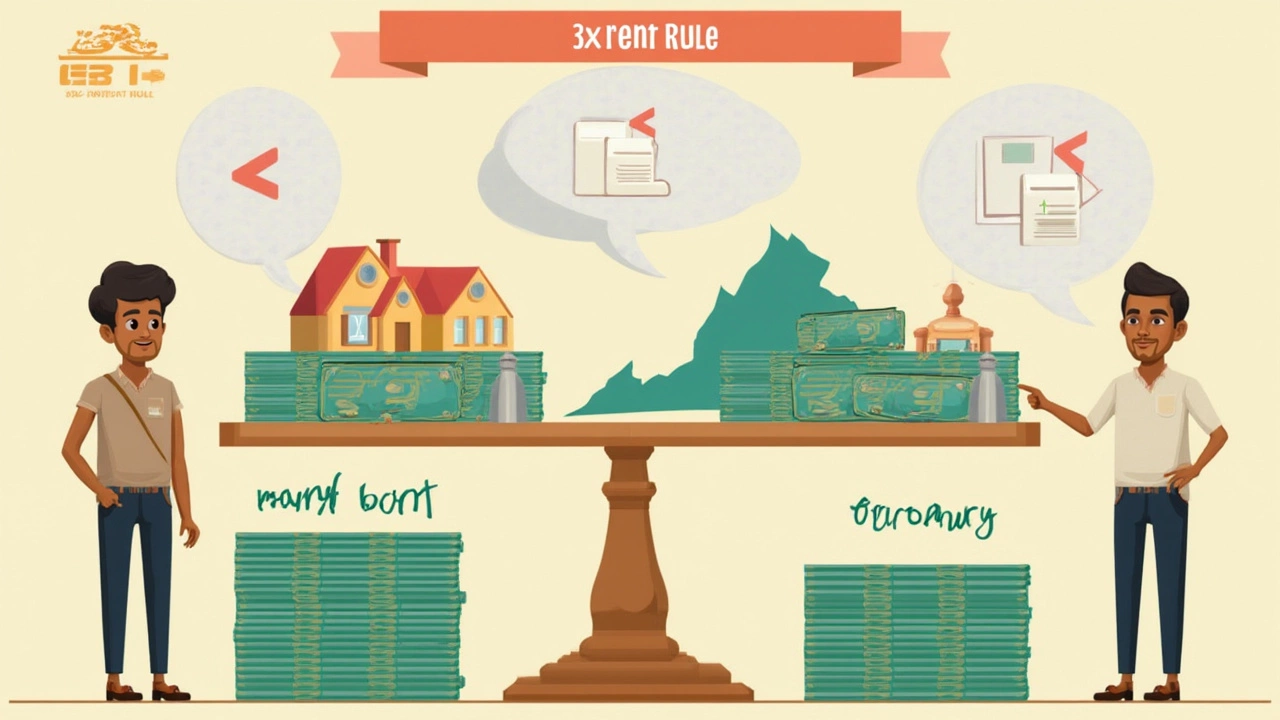Ever applied for an apartment in Virginia and been told you need to make at least three times the rent? You’re not alone—this “3x rent” rule pops up everywhere, but most people aren’t sure if it’s even legal.
Let’s get to the truth fast: There’s no law in Virginia that stops landlords from asking for proof you make three times the rent. This rule isn’t written in any Virginia code. It’s just a popular way landlords size up whether you can handle the lease and bills. They’re looking after their investment—sometimes a little too carefully if you ask most renters.
But just because it’s common doesn’t mean it’s always fair, or that’s the end of the story. If you’re worried you’ll get rejected because you don’t hit that magic number, there are ways to work around it, and a few things you should know about your rights. It helps to walk in with your eyes wide open—and maybe a few tricks for persuading a tough landlord.
- Where 3x Rent Comes From
- Virginia Law on Income Requirements
- What Landlords Can (and Can’t) Ask For
- Tips for Renters When Income Isn’t 3x
- How to Push Back If You Think It’s Unfair
Where 3x Rent Comes From
The famous “3x rent” guideline started popping up all over the U.S. in the 1980s. It’s not a legal requirement—it's just a rule of thumb landlords and property managers borrowed from the financial world. The basic idea? If you make at least three times your monthly rent, you’re less likely to fall behind on payments or need to break your lease. That makes landlords feel like they're dodging trouble before it even starts.
Big property management companies pushed this rule hard. They wanted to avoid risky tenants and cut down on costly evictions. It quickly spread to mom-and-pop landlords, who often just follow what the big guys do. Since then, the “3x” figure has taken on a life of its own and shows up on rental ads everywhere—even though it’s not set in stone by any law.
Take a look at how the "3x rent" guideline compares to what renters are actually making in Virginia today:
| Average Rent (VA) | Needed Income (3x Rule) | Median Individual Income (VA) |
|---|---|---|
| $1,400/month | $4,200/month | $4,416/month (2023) |
See how close those numbers run? Not everyone fits that mold, especially people just starting out, folks with student loans, or families living on a single paycheck. Still, property managers often stick with the “3x” because it’s simple and makes for quick screening. They believe it weeds out applicants who might struggle to pay on time.
If you’re confused because the rule feels random, that’s because, honestly, it kind of is. There’s no official playbook. Some landlords want 2.5x rent, others demand 4x, and a few just want a solid work history. The “3x rent” became popular because it looks like a safe middle ground on paper—in practice, it can leave great renters out in the cold.
So, when you see “must make 3x the rent” in a Virginia listing, remember: It’s not the law—it's just an industry habit that grew into something bigger than intended.
Virginia Law on Income Requirements
Here’s the real deal: Virginia law does not set a limit on how much income a landlord can require. That means landlords can ask tenants to clear the 3x rent threshold, or any other multiple, as long as they aren’t discriminating for reasons banned under state or federal law—like race, color, religion, national origin, sex, disability, familial status, or source of income in some cases.
Virginia’s Fair Housing law lines up with federal protections, but it doesn’t say anything about how high an income requirement can be. So, while 3x the rent is basically an industry “rule of thumb,” there’s nothing stopping a landlord from saying you need to make two times, four times, or even more. It sounds wild, but that’s the legal reality here.
What matters most is that landlords have to treat every applicant the same way. If a landlord tells you, “We require three times the monthly rent,” and then they pick and choose who has to follow that based on something like race or family status, that’s where they cross the line and break the law. But if they just want rock-solid proof you meet their income cutoff, there’s nothing illegal about it in Virginia.
If you apply for a rental in another state, rules could look different. A few cities and states do have laws that limit how much income a landlord can demand, but Virginia isn’t one of them—at least not right now.

What Landlords Can (and Can’t) Ask For
When it comes to renting in Virginia, landlords have some leeway to screen tenants, but there are rules they have to play by. The “3x rent” income requirement is super common, but it isn’t set by law—it’s just a guideline that a lot of landlords use to guess if renters can afford the place. Still, they can’t throw just any question or demand at you.
3x rent is only an example of what landlords usually want to see. They can ask for proof of income—think pay stubs, job offer letters, or even bank statements—to check if you make enough to cover rent and basic living expenses.
- They can ask for income verification—this usually means pay stubs, W-2s, or tax returns.
- Landlords can run credit and background checks (with your permission).
- They can call references or previous landlords.
- But they can’t ask about stuff protected by federal and state law, like your race, sex, religion, disability, or if you get public assistance. That’s flat-out illegal under the Fair Housing Act.
- They can’t demand you meet an income rule just to weed out families with kids or people on housing assistance—that counts as discrimination.
A lot of renters wonder, "Is there a cap on how high a landlord can set the income requirement?" Virginia doesn’t have one. As long as the rule applies the same to everyone and isn’t designed to sidestep discrimination laws, technically it’s allowed.
Here’s a quick look at what’s usually fair game and what’s off-limits:
| Landlord Request | Allowed? |
|---|---|
| Proof of employment | Yes |
| Require 3x monthly rent income | Yes, if not discriminatory |
| Background/credit check | Yes (with consent) |
| Questions about race/religion | No |
| Family status questions | No |
| Proof you don’t use housing vouchers | No (illegal in some VA cities) |
If anything feels fishy—like they push for personal info not tied to your finances or try to dig into private stuff that isn’t anyone’s business—you don’t have to answer. And if you think a landlord crossed a line, you’ve got options for reporting it. Keeping a paper trail helps whenever things get tricky.
Tips for Renters When Income Isn’t 3x
If your income doesn’t stack up to that “3x rent” number in Virginia, don’t panic—plenty of renters are in the same boat. Landlords can set their own rules, but that doesn’t mean you have no options. Here’s what you can do that actually works in the real world.
3x rent is just a guideline, not a law or requirement set by the state. Some landlords will budge if you show you’re reliable in other ways.
- Add a Co-Signer or Guarantor: Bringing in a co-signer—someone with a stronger income or credit—means the landlord gets extra security. Parents or close relatives are common choices. If you default, the co-signer has to cover the rent, which puts landlords at ease.
- Offer a Larger Deposit: Virginia landlords can ask for a security deposit that’s up to two months’ rent. If you’re a little short on income, offering the max deposit might help you stand out.
- Show Off Your Rental History: Prove you’re a responsible renter by giving references from past landlords or showing a record of on-time rent payments. Some landlords care more about payment history than pay stubs.
- List All Sources of Income: Side gigs, child support, alimony, or consistent government benefits should be counted. As long as income is verifiable, it can help you get closer to the landlord’s target.
- Share Your Credit Report: A strong credit score can make up for not meeting the income cut. Landlords see you’re good with bills overall—a big plus.
According to Apartment List data from 2024, 32% of U.S. renters spend more than 30% of their income on rent—so don’t think you’re the only one not hitting the so-called sweet spot.
| Income-to-Rent Ratio | % of Virginia Renters |
|---|---|
| Below 3x rent | 41% |
| 3x rent or more | 59% |
"Income barriers often weed out great tenants," says John Williams, a property manager in Richmond. "If applicants can prove they pay bills and communicate well, most landlords will consider them."
Stuck at a property where the landlord won’t budge? Consider building your rental history at a smaller place or with an independent landlord. Many big apartment complexes stick with strict policies, but individual owners can be way more flexible.

How to Push Back If You Think It’s Unfair
If you’re faced with a landlord demanding proof of 3x rent income and it just doesn’t seem right, you’ve got a few ways to stand your ground. Virginia laws give landlords wiggle room to set their own income rules, but they still have to play by certain rules—especially when it comes to discrimination.
First off, always ask the landlord why they require three times the rent. Sometimes the answer is as simple as “that’s our policy,” but digging deeper can reveal if they’ve ever made exceptions. They legally can’t treat you differently from other applicants based on things like race, religion, or disability—fair housing laws are rock solid on that. In the words of the Virginia Fair Housing Board:
“A landlord’s criteria must be applied consistently and cannot target certain groups or create obstacles for people with protected characteristics.”
Now, if you’re convinced the policy feels unfair or unevenly enforced, here’s what you can do:
- Show more proof of stability: Offer pay stubs, savings account snapshots, or a letter from your employer saying your job is steady. Got a good rental history? Share it.
- Suggest alternatives: Offer a bigger security deposit if state law allows. Some landlords might let you add a co-signer or roommate who helps meet that 3x rent rule.
- Point to the law: If you think you’re being singled out for a reason protected by law (like a disability), mention the Fair Housing Act. Sometimes, just bringing this up makes landlords rethink.
- Put it in writing: Writing out your case makes it clear you’re serious and keeps a record if you need to go further.
Here’s a quick table with basic renter protections and facts in Virginia:
| Rule/Right | Applies In Virginia? | Notes |
|---|---|---|
| Landlord can set income requirements | Yes | No limit, but must apply equally |
| Discrimination based on race, religion, etc. | No | Illegal under Fair Housing Act |
| Special rules for people with disabilities | Yes | Landlords must offer reasonable accommodation |
| Security deposit maximum | Yes | Up to 2 months’ rent |
If all else fails, you can file a complaint with the Virginia Fair Housing Office, or even go through Legal Aid. But a lot of the time, landlords just want to see you’ll pay on time and respect the place—you might just have to show them in a way that makes sense to you.





